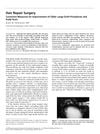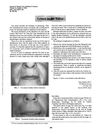 November 2000 in “Current problems in dermatology”
November 2000 in “Current problems in dermatology” New treatments for hair loss and excessive hair growth show promise with few side effects and advancements in laser technology.
 19 citations,
January 2001 in “Journal of cutaneous laser therapy”
19 citations,
January 2001 in “Journal of cutaneous laser therapy” The Nd:YAG laser safely reduces facial hair and slows regrowth, with patient satisfaction.
 1 citations,
November 2023 in “Clinical, cosmetic and investigational dermatology”
1 citations,
November 2023 in “Clinical, cosmetic and investigational dermatology” The long-pulse alexandrite laser is good for removing hair and treating skin problems like spots and veins.
85 citations,
January 2002 in “Dermatologic Clinics” Lasers and intense pulsed light can safely and effectively remove hair by targeting hair follicles.
 73 citations,
April 1999 in “Dermatologic Clinics”
73 citations,
April 1999 in “Dermatologic Clinics” Lasers and light sources can effectively remove hair, work best on fair skin with dark hair, and usually need multiple treatments.
51 citations,
October 2002 in “Archives of dermatology” The document does not conclude the effectiveness of the 800-nm pulsed-diode laser for treating scalp cellulitis.
47 citations,
November 2000 in “Archives of dermatology” Pulsed infrared laser can effectively reduce symptoms of pseudofolliculitis barbae.
 32 citations,
January 2018 in “American Journal of Clinical Dermatology”
32 citations,
January 2018 in “American Journal of Clinical Dermatology” Hormone therapy affects hair growth in transgender individuals, with testosterone potentially causing hair loss in trans men and estrogen reducing facial/body hair in trans women; treatment options vary.
 25 citations,
June 2015 in “Clinical, Cosmetic and Investigational Dermatology”
25 citations,
June 2015 in “Clinical, Cosmetic and Investigational Dermatology” Microneedling helps increase the absorption of a melanin product into hair follicles, which may improve laser hair removal effectiveness.
 24 citations,
January 2010 in “Annales d'endocrinologie”
24 citations,
January 2010 in “Annales d'endocrinologie” For women with moderate to severe unwanted hair growth or acne, birth control pills are the first choice, with other medications like cyproterone, spironolactone, flutamide, or finasteride as alternatives, and permanent hair removal should be done with electrolysis or laser.
 19 citations,
July 2006 in “Lasers in medical science”
19 citations,
July 2006 in “Lasers in medical science” Laser hair removal is safe and effective for fair-skinned people with dark hair, and using eflornithine with laser treatments can improve results.
19 citations,
January 1999 in “Journal of cutaneous laser therapy” Laser hair removal is a promising method for long-term or permanent hair removal.
15 citations,
January 2019 in “Lasers in surgery and medicine” Home-use light devices can significantly reduce hair but are less effective on very dark skin and slower than professional devices.
12 citations,
January 2011 in “Current problems in dermatology” Lasers and IPL are the most efficient for short-term hair removal, especially for people with dark hair and light skin, but require multiple sessions for longer-lasting effects.
 11 citations,
February 2008 in “British journal of nursing”
11 citations,
February 2008 in “British journal of nursing” Idiopathic hirsutism causes excessive hair growth in women, can be treated with medication and hair removal, but cannot be fully reversed.
 11 citations,
July 1999 in “Dermatologic Surgery”
11 citations,
July 1999 in “Dermatologic Surgery” Corrective hair repair surgery can significantly improve appearance and quality of life for patients with unsatisfactory results from old hair transplants.
 8 citations,
January 1998 in “Journal of Cutaneous Medicine and Surgery”
8 citations,
January 1998 in “Journal of Cutaneous Medicine and Surgery” Hair transplantation is effective for baldness, with new methods improving results, but staying updated is crucial for patient outcomes.
 7 citations,
July 2011 in “Survey of Ophthalmology”
7 citations,
July 2011 in “Survey of Ophthalmology” The document concludes that periocular hair disorders have various causes and treatments, and proper evaluation by specialists is important for management and prognosis.
 5 citations,
January 2015 in “Evidence-based complementary and alternative medicine”
5 citations,
January 2015 in “Evidence-based complementary and alternative medicine” Adding licorice gel to laser treatment is more effective for reducing facial hair than laser alone.
 2 citations,
August 2016 in “Lasers in Surgery and Medicine”
2 citations,
August 2016 in “Lasers in Surgery and Medicine” Photodynamic therapy can remove nonpigmented hair in mice and might work for humans.
 2 citations,
March 1996 in “Journal of The American Academy of Dermatology”
2 citations,
March 1996 in “Journal of The American Academy of Dermatology” The book is an updated guide on hair transplant techniques, useful for beginners and professionals.
 1 citations,
July 2016 in “British Journal of Dermatology”
1 citations,
July 2016 in “British Journal of Dermatology” Men with a certain type of hair loss often use facial moisturizers, and a specific antibiotic treatment may help another hair condition.
1 citations,
January 2009 in “Elsevier eBooks” Effective solutions are needed to manage unwanted facial hair in women.
 1 citations,
May 2004 in “Journal der Deutschen Dermatologischen Gesellschaft”
1 citations,
May 2004 in “Journal der Deutschen Dermatologischen Gesellschaft” The meeting presented new findings on hair stem cells, pigmentation, genetics, and modern hair treatment techniques.
 1 citations,
December 1996 in “Journal of Clinical Laser Medicine & Surgery”
1 citations,
December 1996 in “Journal of Clinical Laser Medicine & Surgery” A doctor describes a new, less expensive method for treating skin issues with a laser, and another doctor corrects a false claim about hair transplantation results.
 November 2019 in “Harper's Textbook of Pediatric Dermatology”
November 2019 in “Harper's Textbook of Pediatric Dermatology” Understanding normal hair growth and loss in children is key to diagnosing and treating hair disorders.
 April 2018 in “The journal of investigative dermatology/Journal of investigative dermatology”
April 2018 in “The journal of investigative dermatology/Journal of investigative dermatology” Higher fluence in hair removal damages hair follicles more, while lower fluence mimics natural hair regression, with long-term IPL treatments effectively reducing hair.
 April 2016 in “Journal of Aesthetic Nursing”
April 2016 in “Journal of Aesthetic Nursing” Men are increasingly removing body hair for looks and cleanliness, and while hair loss can cause distress, it doesn't affect their self-esteem as much as it does in women.
 March 2012 in “Journal of the American Academy of Dermatology”
March 2012 in “Journal of the American Academy of Dermatology” African Americans lack knowledge about laser hair removal safety, Nd:Yag laser treatment is effective with high satisfaction, pressure during surgery can cause hair loss, and treating ovarian inflammation may help with alopecia areata.

Medical Hair Restoration added a non-surgical hair therapy program to help people with early hair loss.























